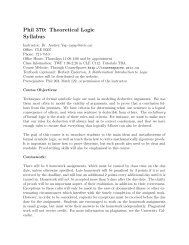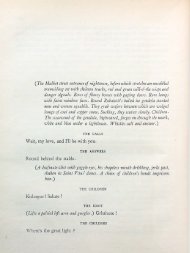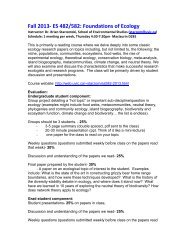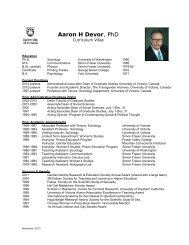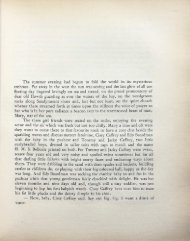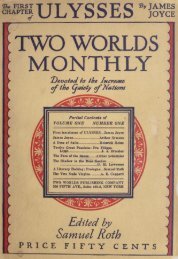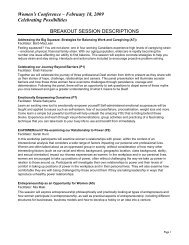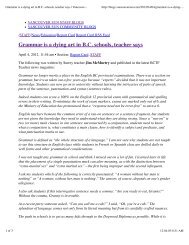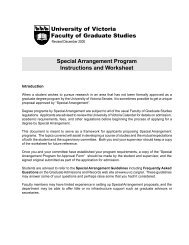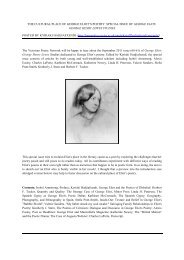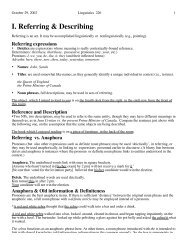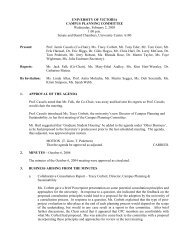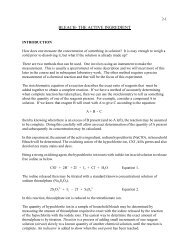Graduate Supplement - University of Victoria
Graduate Supplement - University of Victoria
Graduate Supplement - University of Victoria
Create successful ePaper yourself
Turn your PDF publications into a flip-book with our unique Google optimized e-Paper software.
<strong>University</strong> <strong>of</strong> <strong>Victoria</strong><br />
<strong>Supplement</strong><br />
To the 2011-2012 <strong>Graduate</strong> Calendar<br />
This <strong>Supplement</strong> contains corrections to the 2011-2012 <strong>Graduate</strong> Calendar (obvious typographical errors excluded),<br />
as well as amendments and new programs approved by Senate and the Board <strong>of</strong> Governors since publishing. Specific<br />
revisions are underlined.<br />
Page 3 – 2011-2012 Important Dates<br />
1 st column -correction:<br />
August 2011<br />
12 Friday Term 1 examinations end<br />
16 Tuesday Examinations end including Faculty <strong>of</strong><br />
Law<br />
Page 4 – 2011-2012 Important Dates Cont..<br />
1 st column - correction:<br />
August 2012<br />
16 Thursday Examinations end in Faculty <strong>of</strong> Law<br />
Page 8 – <strong>University</strong> Publications<br />
1 st column - correction to listing<br />
Student Awards and Financial Aid<br />
Provides information for new students about funding<br />
sources, expected costs and strategies for balancing<br />
their budget. Available from Undergraduate<br />
Admissions.<br />
Page 9 – Counselling Services<br />
2 nd column – delete the following two sections:<br />
International Student Counselling &<br />
Adaned Educational Testing/Computer-‐Based Testing<br />
Centre<br />
Replace with the following two new sections:<br />
Counselling for Indigenous Students<br />
Individual, couples and group counseling is available for<br />
Indigenous students through a collaboration with UVic’s<br />
Office <strong>of</strong> Indigenous Affairs. Support can address a wide<br />
variety <strong>of</strong> issues such as: strengthening <strong>of</strong> identity,<br />
processing <strong>of</strong> colonial trauma, navigating the university<br />
environment as an Indigenous learner, and regaining<br />
balance and harmony in all aspect <strong>of</strong> life.<br />
Counselling for International Students<br />
Individual, couples and group counseling is available for<br />
currently registered UVic international students on a<br />
wide variety <strong>of</strong> issues such as culture shock,<br />
communication, navigating the academic system, and<br />
returning home.<br />
Page 15 – Faculty <strong>of</strong> <strong>Graduate</strong> Studies<br />
1 st column – changes to Executive Committee<br />
Gweneth A. Doane, BSN, MA, PhD (<strong>Victoria</strong>), Associate<br />
Dean<br />
Margot Wilson, BA, MA (Tor), MA, PhD (Southern<br />
Methodist)<br />
Representing Business<br />
Chris Graham, Term expires June 30, 2012<br />
2 nd column<br />
Representing the Social Sciences,<br />
David Giles, Department <strong>of</strong> Economics. Term expires<br />
June 30, 2013<br />
Representing the <strong>Graduate</strong> Students’ Society<br />
Julia Munk<br />
Page 16 – Degrees and Programs Offered<br />
1 st column<br />
The Faculty <strong>of</strong> <strong>Graduate</strong> Studies <strong>of</strong> the <strong>University</strong> <strong>of</strong><br />
<strong>Victoria</strong> administers programs leading to the doctoral<br />
and master’s degrees, as well as certificates and<br />
diplomas as shown at right in the following tables.<br />
Details <strong>of</strong> established programs leading to a doctoral or<br />
master’s or post-‐graduate degree are provided within<br />
the <strong>Graduate</strong> Programs section. Degrees <strong>Graduate</strong><br />
programs may also be taken with a co-‐operative<br />
education option, with an interdisciplinary focus, or by<br />
special arrangement.<br />
Faculty Admissions<br />
General Requirements and Procedures for All <strong>Graduate</strong><br />
Students<br />
The minimum general and academic requirements for<br />
admission to the Faculty <strong>of</strong> <strong>Graduate</strong> Studies include:<br />
1. an academic standing acceptable to the Faculty <strong>of</strong><br />
<strong>Graduate</strong> Studies and the academic unit concerned<br />
1. a baccalaureate degree (or equivalent degree from<br />
another country) from an accredited and recognized<br />
institution<br />
2. a grade point average <strong>of</strong> 5.0 (B) in the work <strong>of</strong> the<br />
last two years (30 units) leading to the bachelor’s<br />
degree. (Please note that individual academic units <strong>of</strong>ten<br />
set higher entrance standards.)<br />
3. satisfactory assessment reports<br />
4. the availability <strong>of</strong> an appropriate supervisor within<br />
the academic unit concerned<br />
5. the availability <strong>of</strong> adequate space and facilities<br />
within the academic unit concerned.<br />
Application for Admission<br />
There is an application fee <strong>of</strong> $100 102 if all<br />
postsecondary transcripts come from institutions<br />
within Canada and $125 127 if any post-‐secondary<br />
transcripts come from institutions outside <strong>of</strong> Canada. It<br />
is non-‐refundable and can not be credited towards<br />
tuition fees. Applications will only be processed after<br />
the application fee has been received.<br />
Application materials are kept on file for one year, and<br />
may be reactivated on request within that year and by<br />
1
submission <strong>of</strong> a new application and application fee.<br />
Payment must be made online at time <strong>of</strong> application<br />
using either Visa or Mastercard. Payment must be made<br />
in Canadian funds drawn on a Canadian bank, or in US<br />
funds drawn on a US bank.<br />
Page 35 - Tuition and Other Fees<br />
2 nd column<br />
UVic Students’ Society Universal Bus Pass Plan (U-<br />
Pass)<br />
The UVSS provides a mandatory bus pass plan for all<br />
graduate students. U-‐Pass was approved by student<br />
referendum in 1999. The U-‐Pass fee is $78.50 76.00 per<br />
term. U-‐Pass gives students unlimited access to all<br />
Greater <strong>Victoria</strong> BC Transit buses and HandyDart<br />
services at all times and on all days.<br />
Fees for International Students<br />
International students (those not holding Canadian<br />
citizenship or permanent residency at the beginning <strong>of</strong><br />
the session) are required to pay international tuition<br />
fees for graduate programs and courses. Fees will be<br />
adjusted to regular rates for students who show a<br />
permanent residency card before the last day <strong>of</strong> each<br />
term. the deadline for dropping courses for each session<br />
(October 31, February 28 and June 30).<br />
Under Domestic Tuition<br />
Athletics/Recreation-‐per term<br />
(on-‐campus and local only) $76.00 71.50<br />
<strong>Graduate</strong> Students’ Society-‐per term $55.63 53.94<br />
<strong>Graduate</strong> Students’ Society-‐per<br />
co-‐op work term $27.82 26.97<br />
GSS Extended Health Care Plan:<br />
per year (single coverage) $328.00 255.00<br />
Family opt-‐in . $260.00<br />
8 month pro-‐rated fee . $219.00 170.00<br />
Family opt-‐in . $190.00<br />
Dental Care Plan-‐per year<br />
(single coverage) . $214.00 185.00<br />
8 month pro-‐rated fee . $143.00 125.00<br />
U-‐Pass Bus Pass $78.50 82.50<br />
International Tuition<br />
Full fee installment $2002.72<br />
Half fee installment . $1001.36<br />
Non-‐degree, per unit $797.42<br />
<strong>Graduate</strong> reregistration fees, per term<br />
until maximum completion limits . $797.42<br />
Program extension fee $2002.72<br />
<strong>Graduate</strong> co-‐op work term fee (this fee<br />
does not form part <strong>of</strong> the minimum<br />
program fee described under<br />
Program Fees, above) $726.24<br />
Athletics/Recreation-‐per term<br />
(on-‐campus and local only) . $76.00 74.50<br />
<strong>Graduate</strong> Students’ Society-‐per term $55.63 53.94<br />
<strong>Graduate</strong> Students’ Society-‐per<br />
co-‐op work term . $27.82 26.97<br />
GSS Extended Health Care Plan:<br />
per year (single coverage) $328.00 255.00<br />
Family opt-‐in . $260.00<br />
8 month pro-‐rated fee . $219.00 170.00<br />
Family opt-‐in . $190.00<br />
Dental Care Plan-‐per year<br />
(single coverage) $ 214.00 185.00<br />
8 month pro-‐rated fee . $143.00 125.00<br />
U-‐Pass Bus Pass $78.50 82.50<br />
Page 40 – Biochemistry & Microbiology<br />
3 rd column – correction to staff listing<br />
<strong>Graduate</strong> Secretary: Melinda Powell & Sandra<br />
Boudewyn<br />
Page 45 – Business<br />
2 nd column – changes to faculty listing<br />
Wade Danis, PhD (<strong>University</strong> <strong>of</strong> Indiana)<br />
International business strategy and management<br />
Daniel Krause, PhD (Arizona State <strong>University</strong>)<br />
Operations management, supply chain management<br />
Page 62 – Cultural Heritage Management<br />
**New Program**<br />
See attached Appendix A<br />
Page 76 – Educational Psychology and Leadership<br />
Studies<br />
1 st column – Program Requirement correction<br />
Master’s in Counselling<br />
The program requirement for the MEd degree is<br />
a minimum <strong>of</strong> 25.5 24 units <strong>of</strong> study. The MA degree<br />
is a minimum <strong>of</strong> 28.5 27 units <strong>of</strong> study. The following<br />
ED-‐D courses………<br />
MEd Program Requirements<br />
A minimum <strong>of</strong> 25.5 24 units <strong>of</strong> course work is required<br />
in the MEd program and a comprehensive exam.<br />
Page 93 – Greek and Roman Studies<br />
2 nd column – correction to contact information<br />
<strong>Graduate</strong> Adviser: Ingrid E. Holmberg Gregory Rowe<br />
Email: Ingrid@uvic.ca gdrowe@uvic.ca<br />
Phone:. 250-‐721-‐8528 8521<br />
Page 110 – Mechanical Engineering<br />
3 rd column – correction to staff listing<br />
<strong>Graduate</strong> Adviser: Peter Oshkai Andrew Rowe<br />
Email: poshkai arowe@me.uvic.ca<br />
Phone:. 250-‐721-‐8916<br />
<strong>Graduate</strong> Secretary: Christel Taylor Preet Grewal<br />
Page 111 – Mechanical Engineering Cont…<br />
1 st column – deletion to faculty listing<br />
David Sinton, PEng, PhD (Toronto), Associate Pr<strong>of</strong>essor<br />
Micr<strong>of</strong>luidics, Lab-‐on-‐chip technologies, Biomedical<br />
Microdevices, Biomedical Engineering, Fluid Flow and<br />
Heat Transfer in Microstructures<br />
Page 117 – Neuroscience<br />
**New Program**<br />
See attached Appendix B<br />
Page 117 – Nursing<br />
2
2 nd column – correction to contact information<br />
Associate Director, <strong>Graduate</strong> Education:<br />
Dr. Lynne Young Marjorie McIntyre<br />
Email: leyoung@uvic.ca mcintyre@uvic.ca<br />
Phone:. 250-‐472-‐5678 5283<br />
Page 124 – Pacific and Asian Studies<br />
1 st column – correction <strong>of</strong> name<br />
Chair: M. Hiroko Noro<br />
Page 125 – Philosophy<br />
2 nd column – correction to contact information<br />
Acting-‐Chair: Dr. Jeff Foss Dr. James O. Young<br />
Email: jefffoss@uvic.ca joy@uvic.ca<br />
Phone:. 250-‐721-‐7513 7509<br />
<strong>Graduate</strong> Adviser: Cindy Holder Colin Macleod<br />
Email: clholder@uvic.ca cmacleod@uvic.ca<br />
Phone:. 250-‐721-‐7516 7521<br />
Page 129 – Political Science<br />
1 st column – deletion <strong>of</strong> faculty listing<br />
Dennis Pilon, PhD (York)<br />
Canadian and comparative democratic institutions,<br />
party systems (Western, industrialized countries),<br />
election administration, history <strong>of</strong> democratization,<br />
electoral reform, citizen engagement policies, working<br />
class politics, gay and lesbian politics<br />
Page 138 – Public Health & Social Policy<br />
3 rd column – remove the last sentence<br />
Financial Support<br />
A number <strong>of</strong> awards, scholarships and bursaries are<br />
available to full-‐time students. The Faculty <strong>of</strong> <strong>Graduate</strong><br />
Studies provides a list <strong>of</strong> available awards and<br />
necessary applications online at<br />
or<br />
through their <strong>of</strong>fice in the <strong>University</strong> Centre.<br />
Information on bursaries and scholarships can be found<br />
at the UVic Student Awards & Financial Aid Office,<br />
located in the <strong>University</strong> Centre, or through its website<br />
at . In addition, the provincial,<br />
territorial and federal governments each <strong>of</strong>fer student<br />
loans to fulltime candidates who meet the<br />
requirements.<br />
Page 148– Sociology<br />
1 st column - change in exam designation<br />
Dissertation<br />
Students are required to complete and defend a<br />
dissertation proposal before their supervisory<br />
committee, normally within six months <strong>of</strong> passing<br />
the candidacy comprehensive exams. The proposal ….<br />
Page 151 – Visual Arts<br />
2 nd column – correction to contact information<br />
<strong>Graduate</strong> Adviser: Lynda Gammon Robert Youds<br />
Email: lgammon@finearts.uvic.ca ryouds@uvic.ca<br />
Phone:. 250-‐721-‐8015 8012<br />
Pages 153– 156 Research Centres<br />
1 st column - correction/addition:<br />
Dr. Michael Miller, Acting Associate Vice-‐<br />
President, Research<br />
Dr. Rachael Scarth, MA, PhD (Cambridge),<br />
Associate Vice President Research Operations<br />
1 st column – change <strong>of</strong> name for the former IDC<br />
listing<br />
UVic Industry Partnership (IP)<br />
Innovation and Development Corporation<br />
(IDC) <br />
IP is the <strong>University</strong> Industry Liaison Office….<br />
Page 154 – Centre for Asia-Pacific Initiatives (CAPI)<br />
2 nd column – Remove the following staff listing:<br />
Heidi Tyedmers, MA (UVic), Program Manager<br />
Centre for Early Childhood Research & Policy<br />
3 rd column – new director and new phone number<br />
Ulrich Mueller, PhD (Temple <strong>University</strong>,<br />
Philadelphia), Director<br />
Phone: 250 721-‐7548<br />
Add the following two NEW research centres:<br />
**NEW** Centre for Advanced Security,<br />
Privacy, and Information Systems Research<br />
(ASPIRe)<br />
Stephen W. Neville, PhD (<strong>Victoria</strong>), PEng (BC),<br />
Faculty <strong>of</strong> Engineering, Director<br />
The ASPIRe Centre was formally established in<br />
2011 within the Faculty <strong>of</strong> Engineering with<br />
support from the Government <strong>of</strong> the Province <strong>of</strong><br />
British Columbia. ASPIRe focuses on advancing<br />
research and understanding with the three core<br />
inter-‐related domains <strong>of</strong> cyber-‐security,<br />
information privacy, and the underlying<br />
information systems that have become intrinsic to<br />
modern societies.<br />
ASPIRe has a strong focus on facilitating and being<br />
a catalyst for research collaborations within the<br />
university in these areas and with external<br />
industry, government, and academic partners<br />
regionally, nationally, and internationally. ASPIRe<br />
also serves as a focal point for the research<br />
already underway at the university in these areas.<br />
ASPIRe members are involved in numerous<br />
industry, government, and academic research<br />
projects including in: network engineering,<br />
cryptography and cryptanalysis, distributed/cloud<br />
systems, health information systems, wireless<br />
networks, the semantic web, malware analysis<br />
and classification, social networking, mobile<br />
devices and applications, etc. ASPIRe is associated<br />
3
with NSERC’s national cyber-‐security focused<br />
strategic network -‐ the Interconnected Systems<br />
Security Network (ISSNet) and UVic’s recently<br />
established Entrepreneurial Engineering Masters<br />
Projects (EEMP) conducted in partnership with<br />
the Alacrity Foundation.<br />
ASPIRe is open to and welcoming <strong>of</strong> extending its<br />
collaborations across the wider university<br />
community as the ASPIRe membership fully<br />
realize that developing solutions in these pressing<br />
domains will require active collaborative efforts<br />
between technically and non-‐technically focused<br />
researchers, i.e., across engineering and science,<br />
business, law, psychology, political science,<br />
economics, etc., as well as active collaborations<br />
with its industry and government partners.<br />
ASPIRe members have research project support<br />
through NSERC, CFI, BC KDF, MITACS, etc.<br />
email: aspire@uvic.ca<br />
website: <br />
**NEW**<strong>Victoria</strong> Subatomic Physics and<br />
Accelerator Research Centre (VISPA)<br />
Dean Karlen, BSc (U Alberta), PhD (Stanford),<br />
Director<br />
The <strong>Victoria</strong> Subatomic Physics and Accelerator<br />
Research Centre (VISPA) brings together an<br />
internationally recognized group <strong>of</strong> particle and<br />
accelerator physicists who work to understand<br />
the fundamental nature <strong>of</strong> our Universe. Group<br />
members develop new theoretical approaches,<br />
participate in leading particle physics experiments<br />
around the world, and advance the technology<br />
required to pursue this science. The group shares<br />
computing and laboratory resources, supports<br />
and manages technical staff, and ensures a high-‐<br />
quality graduate and post-‐doctoral training<br />
environment.<br />
The theoretical group has gained an excellent<br />
reputation across Canada and has close ties with<br />
the Perimeter Institute, a world leading institute<br />
in theoretical physics in Waterloo, Ontario. The<br />
experimental projects include ATLAS at CERN, at<br />
the energy frontier, T2K in Japan, a world leading<br />
neutrino experiment, and BABAR at SLAC, at the<br />
precision frontier. The <strong>University</strong> <strong>of</strong> <strong>Victoria</strong> is the<br />
lead institution on the new electron linear<br />
accelerator being built at TRIUMF, thanks to<br />
substantial funding from the Canadian Foundation<br />
for Innovation and the Province <strong>of</strong> British<br />
Columbia.<br />
<strong>Victoria</strong> Subatomic Physics and Accelerator<br />
Research Centre<br />
Elliott Building, Room 207<br />
<strong>University</strong> <strong>of</strong> <strong>Victoria</strong><br />
PO Box 3055, STN CSC<br />
<strong>Victoria</strong>, BC, V8W 3P6<br />
Phone: (250) 721-‐7736<br />
Website: vispa.phys.uvic.ca<br />
Page 178 – ED-D 522<br />
3 rd column – correction <strong>of</strong> Corequisites:<br />
Corequisites: 518 and 519N or 519C and 519L 518,<br />
519C, 519L, 519N<br />
Page 239 – Index “S”<br />
3 st column – correct reference page<br />
Student Awards and Financial Aid 33 8<br />
Page 240 <strong>University</strong> Map Directory<br />
1 st column – correction<br />
Counselling Services <strong>University</strong> Centre C-‐2<br />
Page 230<br />
Senate Ex Officio Members<br />
1 st column<br />
Acting Dean <strong>of</strong> Science, Robert Lipson, BSc, MSc, PhD<br />
Members Elected by the Individual Faculties<br />
1 st column<br />
Social Sciences<br />
Margot Wilson, BA, MA, MA, PhD<br />
2 nd column, -‐ Members Elected by the Convocation<br />
(Terms expire December 31, 2011 2010)<br />
Page 234– Key Contacts<br />
Executive and Administrative Officers<br />
1 st column –replace Acting V-P Research contact with the<br />
following:<br />
Associate Vice-‐President Research<br />
Dr. Michael Miller…….250-‐472-‐5477………250 721-‐7971<br />
Associate Vice-‐President Research Operations<br />
Dr. Rachael Scarth……..250-‐721-‐8960……..250-‐472-‐<br />
4362<br />
<strong>University</strong> Services<br />
2 nd column – corrections/changes<br />
Development:<br />
Mr. Ibrahim Inayatali, Associate Vice-President 250 721-<br />
8961 250 721-7624<br />
Innovation and Development Corporation<br />
UVic Industry Partnerships<br />
Page 235 – <strong>University</strong> Services Cont……<br />
1 st column<br />
Undergraduate Records:<br />
Ms. Kathleen Boland, Associate Registrar Phone: 250-‐<br />
472-‐5975<br />
4
Page 236- Directors <strong>of</strong> Research<br />
1 st column – add New centre information<br />
Centre for Social & Sustainable Innovation<br />
Dr. Monika Winn …….250-‐721-‐6067……….250-‐721-‐<br />
6071<br />
<strong>Victoria</strong> Subatomic Physics & Accelerator Research<br />
Centre<br />
Dr. Dean Karlen………250-‐721-‐7752……250-‐721-‐6585<br />
Centre in Advanced Security, Privacy & Information<br />
Systems<br />
Dr. Stephen Neville….250-‐721-‐6052……250-‐721-‐6017<br />
Change the director <strong>of</strong> the following centre:<br />
Centre for Early Childhood Research and Policy:<br />
Dr. Ulrich Mueller………………………..250-‐721-‐7548<br />
Directors <strong>of</strong> Other Centres<br />
2 nd column – change <strong>of</strong> centre name:<br />
Innovation and Development Corporation (IDC)<br />
UVic Industry Partnerships<br />
Page 237– Index (C)<br />
2 nd column - add:<br />
Chinese Studies Courses 214<br />
Page 238– Index (J)<br />
3 rd column - add:<br />
Japanese Studies Courses 214<br />
Page 423 – Index (S)<br />
2 nd column - add:<br />
Southeast Asian Studies Courses 214<br />
3 rd column – Correct page reference<br />
Student Awards and Financial Aid 33 13<br />
5
APPENDIX A<br />
***NEW***<br />
Cultural Heritage Management<br />
General Information<br />
Contact Information<br />
Cultural Heritage Management Program<br />
Department <strong>of</strong> History in Art in cooperation with the<br />
Division <strong>of</strong> Continuing Studies<br />
Location: Division <strong>of</strong> Continuing Studies Building, Room<br />
343<br />
Mailing Address:<br />
PO Box 3030, Stn CSC<br />
<strong>Victoria</strong>, BC V8W 3N6<br />
Canada<br />
Courier Address:<br />
3800 Finnerty Road<br />
Continuing Studies Building, Room 343<br />
<strong>Victoria</strong>, BC V8W 3N6<br />
Canada<br />
Telephone Number: 250-721-8457<br />
Fax Number: 250-721-8774<br />
Email: crmcoord@uvic.ca<br />
Website: and<br />
<br />
Program Director: Joy Davis<br />
Email: joydavis@uvic.ca<br />
Phone: 250-721-8462<br />
Certificate and Diploma Offerings<br />
The Cultural Heritage Management Program <strong>of</strong>fers a<br />
<strong>Graduate</strong> Pr<strong>of</strong>essional Certificate in Cultural Heritage<br />
Studies that can be completed on its own or laddered to a<br />
<strong>Graduate</strong> Pr<strong>of</strong>essional Diploma in Cultural Heritage<br />
Management. Both programs address issues and practices<br />
involved in the fields <strong>of</strong> cultural heritage, and are designed<br />
for individuals working with cultural heritage in settings<br />
such as museums, cultural centres, galleries, historic sites,<br />
parks and landscapes, urban revitalization and public<br />
service. The <strong>Graduate</strong> Pr<strong>of</strong>essional Certificate is also<br />
designed to enable students engaged in graduate degree<br />
studies in related fields at UVic to undertake concurrent<br />
degree/certificate programs in which selected certificate<br />
courses are transferrable to the degree with the approval <strong>of</strong><br />
the academic unit. Concurrent degree/certificate students<br />
can receive both a graduate degree and a graduate<br />
pr<strong>of</strong>essional certificate upon completion <strong>of</strong> program<br />
requirements.<br />
Admission Requirements<br />
<strong>Graduate</strong> Pr<strong>of</strong>essional Certificate in Cultural Heritage<br />
Studies<br />
To be eligible for admission, students must have an<br />
undergraduate degree with a minimum B (5.0) average in<br />
their last two years (30) units leading to the undergraduate<br />
degree. Applicants with four or more years <strong>of</strong> relevant<br />
pr<strong>of</strong>essional experience whose grade point average in their<br />
undergraduate degree is below B may be considered for<br />
admission as a mature student.<br />
Applications for admission are first received by the<br />
<strong>Graduate</strong> Admissions and Records Office. This <strong>of</strong>fice<br />
evaluates each applicant’s transcripts to determine<br />
admissibility to the program. After this determination, the<br />
application is forwarded to the Program Admissions<br />
Committee for consideration. Admission is a competitive<br />
process, based on both grades from prior studies, and<br />
evidence <strong>of</strong> pr<strong>of</strong>essional experience and achievements that<br />
enable the Admission Committee to assess an applicant’s<br />
ability to successfully complete the program.<br />
To apply for the <strong>Graduate</strong> Pr<strong>of</strong>essional Certificate if you<br />
are not enrolled in a graduate degree program, please<br />
complete the following, and submit either online or by<br />
mail, to <strong>Graduate</strong> Admissions and Records:<br />
• the Faculty <strong>of</strong> <strong>Graduate</strong> Studies Application for<br />
Admission, available online at or<br />
downloadable from the Faculty <strong>of</strong> <strong>Graduate</strong> Studies<br />
<br />
• two Assessment Reports from academic referees and one<br />
Assessment Report from a workplace referee (e.g. current<br />
or former supervisor) in a cultural heritage workplace. To<br />
strengthen your application, we recommend that your<br />
workplace referee attach a letter <strong>of</strong> reference to the<br />
Assessment Report.<br />
• relevant transcripts<br />
• a pr<strong>of</strong>essional resume<br />
• the <strong>Graduate</strong> Pr<strong>of</strong>essional Certificate in Cultural Heritage<br />
Studies Program Application, available on the Cultural<br />
Heritage Management website<br />
Deadlines<br />
As the starting date for the program may vary from year to<br />
year, application deadlines for current students and new<br />
domestic and international students are posted on the<br />
program website.<br />
To apply for concurrent <strong>Graduate</strong> Pr<strong>of</strong>essional Certificate<br />
status while enrolled in a graduate degree program, please<br />
assemble the following and submit, either online or by<br />
mail by the posted deadline, to <strong>Graduate</strong> Admissions and<br />
Records:<br />
• the online <strong>Graduate</strong> Pr<strong>of</strong>essional Certificate in Cultural<br />
Heritage Studies Program Application on the Cultural<br />
Heritage Management website or download from the<br />
website.<br />
6
• an application to reregister in the Faculty <strong>of</strong> <strong>Graduate</strong><br />
Studies<br />
• two Assessment Reports. While both can be from<br />
academic referees, if you have worked in the cultural<br />
heritage sector we encourage you to seek an assessment<br />
report from a current or former supervisor that comments<br />
on your experience.<br />
• a memorandum from your <strong>Graduate</strong> Advisor confirming<br />
the number <strong>of</strong> Certificate units that can be applied to your<br />
graduate degree.<br />
<strong>Graduate</strong> Pr<strong>of</strong>essional Diploma in Cultural Heritage<br />
Management<br />
Admission to the <strong>Graduate</strong> Pr<strong>of</strong>essional Diploma in<br />
Cultural Heritage Management is based on completion <strong>of</strong><br />
the <strong>Graduate</strong> Pr<strong>of</strong>essional Certificate in Cultural Heritage<br />
Studies, the Diploma in Cultural Resource Management,<br />
or the Pr<strong>of</strong>essional Specialization Certificate in Heritage<br />
Conservation Planning within the previous six years, and<br />
with a 5.0 (B) average.<br />
If you are completing, or have completed, the <strong>Graduate</strong><br />
Pr<strong>of</strong>essional Certificate in Cultural Heritage Studies, you<br />
can apply by completing and submitting the following by<br />
the posted deadline:<br />
• an application to reregister in the Faculty <strong>of</strong> <strong>Graduate</strong><br />
Studies<br />
• the online <strong>Graduate</strong> Pr<strong>of</strong>essional Diploma in Cultural<br />
Heritage Management Program Application on the CHMP<br />
website or download from the website.<br />
If you have completed the Diploma in Cultural Resource<br />
Management or the Pr<strong>of</strong>essional Specialization Certificate<br />
in Heritage Conservation Planning within the previous six<br />
years, please assemble the following and submit, either<br />
online or by mail, to <strong>Graduate</strong> Admissions and Records,<br />
by the posted deadline:<br />
• the Faculty <strong>of</strong> <strong>Graduate</strong> Studies Application for<br />
Admission, available online at or<br />
downloadable from the Faculty <strong>of</strong> <strong>Graduate</strong> Studies<br />
<br />
• two Assessment Reports from academic referees and one<br />
Assessment Report from a workplace referee (e.g. current<br />
or former supervisor) in a cultural heritage workplace. To<br />
strengthen your application, we recommend that your<br />
referee attach a letter <strong>of</strong> reference to the Assessment<br />
Report.<br />
• relevant transcripts<br />
• a pr<strong>of</strong>essional resume<br />
• the <strong>Graduate</strong> Pr<strong>of</strong>essional Certificate in Cultural Heritage<br />
Studies Program Application, available as an online or<br />
downloadable form on the Cultural Heritage Management<br />
website<br />
Note: CH 560 Cultural Heritage Stewardship and<br />
Sustainability is a prerequisite to <strong>Graduate</strong> Pr<strong>of</strong>essional<br />
Diploma coursework for those students entering on the<br />
basis <strong>of</strong> a Diploma in Cultural Resource Management or a<br />
Pr<strong>of</strong>essional Specialization Certificate in Heritage<br />
Conservation Planning<br />
Program Requirements<br />
<strong>Graduate</strong> Pr<strong>of</strong>essional Certificate in Cultural Heritage<br />
Studies<br />
This program is designed to be completed on a part-time<br />
basis, one course per term, to enable students to balance<br />
work or graduate study commitments. You are expected to<br />
participate as part <strong>of</strong> a cohort, beginning with CH 560<br />
Cultural Heritage Stewardship and Sustainability and then<br />
taking the following online courses sequentially over a<br />
period <strong>of</strong> four to five terms depending upon your selection<br />
<strong>of</strong> a final course.<br />
Students can focus on either a museum studies or heritage<br />
planning option by completing the following courses: ore<br />
Course<br />
Core Courses<br />
Cultural Heritage Stewardship and<br />
Sustainability (CH 560) 1.5n<br />
Museum Option<br />
Social Engagement (CH 561) 1.5<br />
Curatorial Principles and Practices (CH 562) 1.5<br />
Visitor Experiences (CH 563) 1.5<br />
Heritage Planning Option<br />
Heritage Conservation in Context (CH 570) 1.5<br />
Determining Significance <strong>of</strong><br />
Heritage Resources (CH 571) 1.5<br />
Planning for Heritage Places (CH 572) 1.5<br />
Elective<br />
The final 1.5 units are selected from the HA 488A-U or<br />
HA 489A-L series <strong>of</strong> courses, or from CH 591 Internship<br />
(1.5) or CH 582 Special Topics in Cultural Heritage<br />
Management (1.5). When 400-level courses are identified<br />
as electives, they will be <strong>of</strong>fered as either CH 588 Special<br />
7
Studies in Museum Principles and Practices or CH 589<br />
Special Studies in Heritage Conservation.<br />
Students currently enrolled in the Diploma in Cultural<br />
Resource Management or the Pr<strong>of</strong>essional Specialization<br />
Certificate in Heritage Conservation Planning may transfer<br />
1.5 units <strong>of</strong> HA 488 or HA 489 credit to the <strong>Graduate</strong><br />
Pr<strong>of</strong>essional Certificate with the approval <strong>of</strong> the <strong>Graduate</strong><br />
Advisor.<br />
<strong>Graduate</strong> Pr<strong>of</strong>essional Diploma in Cultural Heritage<br />
Management<br />
This program is designed to be completed on a part-time<br />
basis, one course per term, to enable students to balance<br />
work commitments. You are expected to take the two core<br />
courses sequentially over two terms. You are able to<br />
complete diploma requirements in two to three terms,<br />
depending upon your selection <strong>of</strong> a final course. Note: CH<br />
560 Cultural Heritage Stewardship and Sustainability is a<br />
prerequisite to <strong>Graduate</strong> Pr<strong>of</strong>essional Diploma coursework<br />
for those students entering on the basis <strong>of</strong> a Diploma in<br />
Cultural Resource Management or a Pr<strong>of</strong>essional<br />
Specialization Certificate in Heritage Conservation<br />
Planning. e Courses<br />
Core Courses<br />
Leadership in Cultural Heritage<br />
Management (CH 580) 1.5<br />
Planning for Cultural Heritage<br />
Management (CH 581) 1.5e<br />
Elective<br />
The final 1.5 units are selected from HA 488A, HA 488M,<br />
HA 488P, HA 488Q, or other HA 488 or HA 489 courses,<br />
or CH 582 Special Topics in Cultural Heritage<br />
Management (1.5), with the approval <strong>of</strong> the <strong>Graduate</strong><br />
Adviser. When 400-level courses are identified as<br />
electives, they will be <strong>of</strong>fered as either CH 588 Special<br />
Studies in Museum Principles and Practices or CH 589<br />
Special Studies in Heritage Conservation.<br />
Program Courses<br />
CH<br />
Cultural Heritage Management<br />
Department <strong>of</strong> History in Art and Division <strong>of</strong><br />
Continuing Studies<br />
Faculty <strong>of</strong> Fine Arts<br />
All Cultural Heritage Management courses are subject to<br />
differential fees.<br />
CH 560 Units: 1.5<br />
Cultural Heritage Stewardship and Sustainability<br />
This course explores cultural heritage in all its diverse<br />
forms, along with the critical roles it plays in defining,<br />
reinforcing and contributing to a sustainable world. It<br />
discusses the scope and meaning <strong>of</strong> cultural heritage<br />
resources in contemporary<br />
society, and analyzes how diverse approaches to the<br />
conservation, access to and management <strong>of</strong> cultural<br />
heritage are continuing to evolve in response to<br />
philosophical changes and social, economic, cultural and<br />
environmental needs.<br />
CH 561 Units: 1.5<br />
Social Engagement<br />
This course explores the pr<strong>of</strong>ound social changes that are<br />
reshaping the nature and purposes <strong>of</strong> museums and other<br />
cultural heritage organizations in a pluralistic society and<br />
considers the implications for all aspects <strong>of</strong> their<br />
specialized functions. It takes a particular focus on how<br />
such organizations serve as dynamic social spaces for<br />
community engagement and action.<br />
CH 562 Units: 1.5<br />
Curatorial Principles and Practices<br />
The course considers how traditional concepts<br />
<strong>of</strong>curatorship have shifted significantly in the face <strong>of</strong> more<br />
democratic relations with community, more subjective<br />
perspectives <strong>of</strong> knowledge, and increasing emphasis on the<br />
museum’s social and educative roles. It explores the nature<br />
and scope <strong>of</strong> contemporary curatorial practice and focuses<br />
on the ways in which curators engage with cultural heritage<br />
resources, develop collections, and generate and share<br />
associated knowledge to meet the needs <strong>of</strong> diverse<br />
communities.<br />
CH 563 Units: 1.5<br />
Visitor Experiences<br />
This course explores the evolving concept and implications<br />
<strong>of</strong> an holistic approach to visitor engagement in museums<br />
and other cultural heritage institutions, and focuses on<br />
museums’ relationships with their publics, their capacity to<br />
serve as social spaces, strategies for audience research, the<br />
characteristics <strong>of</strong> visitors, communications, exhibitions,<br />
formal and informal learning activities, and evaluation<br />
strategies.<br />
Note: A combined undergraduate/graduate course; credit<br />
will only be granted for one <strong>of</strong> 570, HA 489.<br />
CH 570 Units: 1.5<br />
Heritage Conservation In Context<br />
This course addresses the complex range <strong>of</strong> principles and<br />
practices that influence heritage preservation and<br />
conservation planning and decision-making. The<br />
implications <strong>of</strong> international and national charters,<br />
principles, standards and guidelines, are discussed, along<br />
with legal, programmatic and financial incentives and<br />
constraints.<br />
8
CH 571 Units: 1.5<br />
Determining Significance <strong>of</strong> Heritage Resources<br />
This course focuses on the definition <strong>of</strong> the heritage value<br />
or significance <strong>of</strong> a historic place or resource as a key step<br />
in the management <strong>of</strong> cultural heritage resources. It<br />
explores the range <strong>of</strong> historical aesthetic, social and<br />
scientific values that establish the character- defining<br />
elements <strong>of</strong> historic resources, including buildings,<br />
structures, historic districts and cultural landscapes.<br />
Various methods <strong>of</strong> inventory and evaluation are discussed<br />
along with their roles in guiding subsequent conservation<br />
planning and decision-making.<br />
Note: A combined undergraduate/graduate course; credit<br />
will only be granted for one <strong>of</strong> 571, HA 489C.<br />
CH 572 Units: 1.5<br />
Planning for Heritage Places<br />
This course focuses on approaches to planning and heritage<br />
conservation decision-making, and discusses the<br />
components <strong>of</strong> the heritage conservation planning process,<br />
including alignment with local and regional planning<br />
priorities, community involvement and consultation, the<br />
acquisition and integration <strong>of</strong> technical and regulatory<br />
information and pr<strong>of</strong>essional expertise, and the integration<br />
<strong>of</strong> planning in the long term management <strong>of</strong> heritage<br />
resources.<br />
Note: A combined undergraduate/graduate course; credit<br />
will only be granted for one <strong>of</strong> 572, HA 489.<br />
CH 582 Units: 1.5<br />
Leadership in Cultural Heritage Management<br />
This course explores the nature and attributes <strong>of</strong> successful<br />
and visionary cultural sector leadership, and examines<br />
contemporary challenges and issues impacting leadership<br />
and management in the cultural heritage sector. Topics<br />
include leadership theory and models, the roles <strong>of</strong><br />
leadership within organizational and community settings,<br />
building effective teams and partnerships, and resolving<br />
conflict.<br />
CH 583 Units: 1.5<br />
Planning for Cultural Heritage Management<br />
This course addresses strategies for effective planning that<br />
provides both a framework and a guide for all aspects <strong>of</strong><br />
the complex work <strong>of</strong> cultural heritage organizations. The<br />
central roles <strong>of</strong> planning in organizational and project<br />
management are explored, along with a range <strong>of</strong> planning<br />
principles and methods suited to the cultural heritage<br />
sector.<br />
CH 584 Units: 1.5<br />
Topics in Cultural Heritage Management<br />
Note: This course may be taken more than once for credit<br />
in different topic areas.<br />
Prerequisites: Permission <strong>of</strong> the Program Adviser.<br />
CH 588 Units: 1.5<br />
Special Studies in Museum Principles and Practices<br />
May be taken in conjunction with a Cultural Resource<br />
Management course in the HA 488 series with permission<br />
<strong>of</strong> the Program Adviser.<br />
Note: This course may be taken more than once for credit<br />
in different topic areas.<br />
Prerequisites: Permission <strong>of</strong> the Program Adviser.<br />
CH 589 Units: 1.5<br />
Special Studies in Heritage Conservation<br />
May be taken in conjunction with a Cultural Resource<br />
Management course in the HA 489 series with permission<br />
<strong>of</strong> the Program Adviser.<br />
Note: This course may be taken more than once for credit<br />
in different topic areas.<br />
Prerequisites: Permission <strong>of</strong> the Program Adviser.<br />
CH 591 Units: 1.5<br />
Cultural Heritage Internship<br />
A placement in a cultural heritage management setting,<br />
designed to build knowledge and skills in a specialized area<br />
<strong>of</strong> practice.<br />
Grading: INP, COM, F, N.<br />
9
APPENDIX B<br />
***NEW***<br />
Neuroscience<br />
General Information<br />
The <strong>Graduate</strong> Program in Neuroscience is <strong>of</strong>fered by<br />
faculty appointed in several units <strong>of</strong> the <strong>University</strong><br />
including Biology, Biochemistry and Microbiology,<br />
Psychology, The School <strong>of</strong> Exercise Science, Physical and<br />
Health Education and the Division <strong>of</strong> Medical Sciences. It<br />
is hosted by the Division <strong>of</strong> Medical Sciences and <strong>of</strong>fers<br />
specialized training in Neuroscience to students from a<br />
variety <strong>of</strong> backgrounds.<br />
Contact information<br />
Division <strong>of</strong> Medical Sciences<br />
Location: Medical Sciences Building,<br />
Room 104<br />
Mailing Address:<br />
Division <strong>of</strong> Medical Sciences<br />
<strong>University</strong> <strong>of</strong> <strong>Victoria</strong><br />
PO Box 1700 STN CSC<br />
<strong>Victoria</strong>, BC V8W 2Y2<br />
Courier Address:<br />
Division <strong>of</strong> Medical Sciences<br />
<strong>University</strong> <strong>of</strong> <strong>Victoria</strong><br />
3800 Finnerty Rd<br />
<strong>Victoria</strong> BC V8P 5C2<br />
Telephone Number: 250-472-5500<br />
Fax Number: 250-472-5505<br />
Website: <br />
Neuroscience Program Adviser: Dr. Brian Christie<br />
Email: brain64@uvic.ca<br />
Phone: 250-472-4244<br />
<strong>Graduate</strong> Secretary: Karen Myers<br />
Email: dmscsec@uvic.ca<br />
Phone: 250-853-3129<br />
Faculty Members and Areas <strong>of</strong> Research<br />
Craig Brown, PhD (Calgary)<br />
Stroke neuroanatomy, fluorescence imaging<br />
Robert Burke, PhD (Alberta)<br />
Cellular signalling and neural specification,<br />
developmental biology<br />
Daniel Bub, PhD (Rochester)<br />
Cognitive neuropsychology, brain injury<br />
Robert Chow, PhD (New York <strong>University</strong>)<br />
Neuronal cell type diversity, retinal development<br />
Brian Christie, PhD (Otago)<br />
Learning and memory, synaptic plasticity,<br />
neurogenesis<br />
Kerry Delaney, PhD (Princeton)<br />
Synaptic transmission and plasticity,<br />
neurodevelopmental disease<br />
Clay Holroyd, PhD (Illinois)<br />
Neurobiological mechanisms <strong>of</strong> cognitive control<br />
D. Stephen Lindsay, PhD (Princeton)<br />
Memory and cognition, eyewitness memory,<br />
children’s memory<br />
Michael Masson, PhD (Colorado)<br />
Memory and cognition, cognitive skill development,<br />
computational modeling<br />
Patrick Nahirney, PhD (UBC)<br />
Neuroanatomy, synaptic ultrastructure electron<br />
microscopy, live cell imaging<br />
Raad Nashmi, PhD (Toronto)<br />
Neurotransmision molecular mechanism <strong>of</strong> addiction<br />
Louise Page, PhD (Univ. <strong>of</strong> <strong>Victoria</strong>)<br />
Evolutionary developmental biology <strong>of</strong> gastropod<br />
molluscs, functional morphology <strong>of</strong> marine<br />
invertebrates<br />
Ronald Skelton, PhD (UBC)<br />
Cognitive neuroscience, spatial navigation, brain<br />
injury<br />
Leigh Anne Swayne, PhD (Calgary)<br />
Neurogenesis and the bioelectric control <strong>of</strong> new<br />
neurons in healthy and injured/diseased brain, ion<br />
channels as therapeutic targets for brain repair<br />
Jim Tanaka, PhD (Oregon)<br />
Visual object and face recognition<br />
John Taylor, PhD (Simon Fraser Univ.)<br />
Comparative genomics, gene and gene duplication<br />
Stephanie Willerth, PhD (Washington)<br />
Tissue engineered scaffolds for promoting stem cell<br />
differentiation, novel drug delivery systems, and<br />
analysis <strong>of</strong> stem cell differentiation using next<br />
generation sequencing<br />
E. Paul Zehr, PhD (Alberta)<br />
Neuromuscular plasticity and motor recovery after<br />
injury<br />
Associated Faculty<br />
C.A. Elizabeth Brimacombe PhD (Iowa State)<br />
Eyewitness testimony, social cognition<br />
Mauricio A. Garcia-Barrera PhD, (Univ. <strong>of</strong> Georgia)<br />
Clinical neuropsychology<br />
David F. Hultsch, PhD Syracuse)<br />
Life-span development<br />
Kimberly A. Kerns, PhD (Chicago Medical School)<br />
Pediatric neuropsychology, clinical psychology,<br />
attention and memory disorders<br />
Catherine A. Mateer, PhD (Univ. <strong>of</strong> Western Ontario)<br />
Clinical neuropsychology, neuropsychological and<br />
cognitive rehabilitation, traumatic brain injury<br />
Stuart MacDonald PhD (Univ. <strong>of</strong> <strong>Victoria</strong>)<br />
Life-span development<br />
Ulrich Mueller, PhD (Temple)<br />
Development <strong>of</strong> self-regulation, executive function,<br />
social development in infancy and early childhood<br />
J. Don Read PhD (Kansas State)<br />
Memory and cognition<br />
Nancy Sherwood PhD (California-Berkeley)<br />
Neuropeptides in the control <strong>of</strong> reproduction and<br />
growth; evolution <strong>of</strong> neuropeptides, mainly in fish<br />
10
Degrees and Specializations Offered<br />
MSc and PhD in Neuroscience<br />
Financial Support<br />
All students accepted into the program are guaranteed a<br />
minimum stipend which can be comprised <strong>of</strong> a<br />
combination <strong>of</strong> scholarship, fellowship, Teaching<br />
Assistantship and support payments from individual<br />
research grants. For this reason students are accepted into<br />
individual laboratories as well as by the Program. Students<br />
admitted to the program will have as a home department<br />
the department or school in which their thesis supervisor<br />
has their primary appointment. Students will be eligible<br />
for fellowships and Teaching Assistantships administered<br />
by their home department.<br />
All graduate students are financially supported to<br />
undertake full-time graduate studies. MSc students<br />
deemed to be making satisfactory progress towards their<br />
degree requirements are guaranteed a minimum <strong>of</strong> $20,000<br />
per annum for two years and PhD students $20,000 per<br />
annum for four years from the sources listed above.<br />
Funding is still available in additional years <strong>of</strong> the<br />
program but the minimum is no longer enforced.<br />
Admission Requirements<br />
General<br />
Initial inquires should be made to individual faculty or the<br />
<strong>Graduate</strong> Adviser, <strong>Graduate</strong> Neuroscience Program. In<br />
addition to the documentation required by the Faculty <strong>of</strong><br />
<strong>Graduate</strong> Studies (see page 16) students will need to<br />
supply a letter outlining the applicant’s research interests<br />
and identifying prospective research supervisors.<br />
Applicants whose native language is not English must<br />
write the TOEFL (Test <strong>of</strong> English as a Foreign Language)<br />
and submit scores to the <strong>Graduate</strong> Admissions and<br />
Records Office. A score <strong>of</strong> at least 630 on the paper based<br />
version <strong>of</strong> the test or 267 on the computer based test or an<br />
overall score <strong>of</strong> 90 on the internet based TOEFL is<br />
required.<br />
Admission to the MSc Program<br />
Admission requires a bachelor’s degree with course-work<br />
appropriate to the proposed thesis research concentration.<br />
Students who have achieved the minimum grade point<br />
average (GPA) <strong>of</strong> the home department during the last two<br />
years <strong>of</strong> study will be considered for direct admission to<br />
the Program. Students meeting the Faculty <strong>of</strong> <strong>Graduate</strong><br />
Studies minimum will be conditionally considered for<br />
admission on a case-by-case basis.<br />
Admission to the PhD Program<br />
Students can enter the PhD program having previously<br />
achieved a MSc degree, by transferring from the MSc<br />
program at the end <strong>of</strong> their first year upon<br />
recommendation <strong>of</strong> the supervisory committee or directly<br />
with a BSc. Students with a bachelor’s degree with coursework<br />
appropriate to the proposed thesis research<br />
concentration and a first class GPA (over 7.0 on the UVic<br />
9.0 scale or around 80%) in their last two years <strong>of</strong> study<br />
will be considered for direct entry to the PhD program.<br />
Evidence <strong>of</strong> research experience including summer<br />
research, honours thesis work or peer reviewed<br />
publications will support application to the PhD program<br />
in the absence <strong>of</strong> a MSc degree. Admission based on a<br />
MSc qualification will normally require a graduate GPA <strong>of</strong><br />
over 7.0 on the UVic scale. Applicants to this program will<br />
require the following to complete their application<br />
package:<br />
• Official Transcript<br />
• Acceptance by the Neuroscience Admissions Committee,<br />
and<br />
• Acceptance from a faculty member willing to act as the<br />
student’s supervisor and guarantee minimum financial<br />
support requirement will be met,<br />
• Two letters <strong>of</strong> reference.<br />
Deadlines<br />
To be eligible to be considered for a <strong>University</strong> <strong>of</strong> <strong>Victoria</strong><br />
Fellowship applicants must submit their application<br />
package by February 15 for admission in September <strong>of</strong> the<br />
same calendar year. Admission is possible for September 1<br />
or January 1 with a recommendation that applications be<br />
received a minimum <strong>of</strong> 3 months prior to the proposed<br />
entry date for Canadian applicants. Because <strong>of</strong> visa<br />
requirements international students should complete the<br />
application process at least six months in advance.<br />
Program Requirements<br />
MSc – Thesis Option<br />
The MSc is a full-time research degree with the<br />
requirement for a thesis and some additional coursework<br />
Course Requirements<br />
NRSC 500 1.5<br />
NRSC 501A or 501B 4.0<br />
Electives 3.0<br />
NRSC 595 1.5<br />
NRSC 599 9.0<br />
All students must complete NRSC 500 Fundamentals <strong>of</strong><br />
Neuroscience covering core concepts in cellular, systems<br />
and cognitive neuroscience. All students will be expected<br />
to enrol in a seminar and research presentation course in<br />
either Cellular (NRSC 501A) or Cognitive (NRSC 501B)<br />
Neuroscience for at least four terms while in the program.<br />
In consultation with their supervisory committee students<br />
will complete two electives from courses <strong>of</strong>fered by the<br />
Program or cross-listed with other departments. The thesis<br />
is expected to comprise a body <strong>of</strong> original experimental<br />
work which is <strong>of</strong> publishable quality defended in an oral<br />
examination in front <strong>of</strong> the supervisory committee and an<br />
external examiner from outside the candidate’s home<br />
department.<br />
Program Length<br />
The MSc is primarily a program <strong>of</strong> full-time independent<br />
research. Students can expect to take a minimum <strong>of</strong> two<br />
years to complete the program.<br />
PhD Program<br />
The PhD program is a full-time program <strong>of</strong> independent<br />
and original research leading to a dissertation which is<br />
defended in an oral examination. Normally, students must<br />
complete a candidacy examination within 21 months <strong>of</strong><br />
entering the program. In addition to the courses listed<br />
below students may be required to take supplemental<br />
courses to address specific gaps in their preparation for<br />
their dissertation work at the advice <strong>of</strong> their supervisory<br />
committee. Students must enroll in the seminar and<br />
11
presentation course appropriate to their area <strong>of</strong> study for at<br />
least eight terms during the course <strong>of</strong> their degree.<br />
Course Requirements<br />
NRSC 500 1.5<br />
NRSC 501A or 501B 8.0<br />
NRSC 693 3.0<br />
Electives 3.0<br />
NRSC 699* 21.0-30.0<br />
*21 units for candidates with an MSc, 30 for candidates<br />
with a BSc<br />
Dissertation<br />
The topic and scope <strong>of</strong> the dissertation research is<br />
determined by the supervisory committee and the<br />
candidate. The written dissertation must comprise an<br />
original work <strong>of</strong> research <strong>of</strong> a quality suitable for<br />
publication as at least one peer reviewed journal article.<br />
Oral Examination<br />
The dissertation must be defended in an oral examination<br />
in front <strong>of</strong> the supervisory committee and an external<br />
examiner from outside the university to ensure that the<br />
research and dissertation meet the required standard.<br />
Program Length<br />
The PhD is a full-time research degree that normally takes<br />
a minimum <strong>of</strong> four years to complete.<br />
NRSC<br />
Neuroscience<br />
Division <strong>of</strong> Medical Sciences<br />
NRSC 500 Units: 1.5<br />
Fundamentals <strong>of</strong> Neuroscience<br />
This is a breadth course that is team-taught by Cellular<br />
and Cognitive Neuroscience faculty. The course covers<br />
the essential basics <strong>of</strong> current neuroscience and<br />
introduces students to specific faculty research<br />
interests.<br />
Note: This course is required for all students enrolled in the<br />
Neuroscience <strong>Graduate</strong> Program.<br />
NRSC 501A Units: 1.0<br />
Advanced Topics in Cellular Neuroscience<br />
Seminar on current topics in Cellular Neuroscience.<br />
Note: Course participation in NRSC 501(A or B) is<br />
mandatory every year the student is enrolled in the<br />
Neuroscience <strong>Graduate</strong> Program up to a maximum <strong>of</strong> four<br />
terms for MSc and eight terms for PhD students.<br />
NRSC 501B Units: 1.0<br />
Advanced Topics in Cognitive Neuroscience<br />
Seminar on current topics in Cognitive Neuroscience.<br />
Note: Course participation in NRSC 501(A or B) is<br />
mandatory every year the student is enrolled in the<br />
Neuroscience <strong>Graduate</strong> Program up to a maximum <strong>of</strong> four<br />
terms for MSc and eight terms for PhD students.<br />
NRSC 595 Units: 1.5<br />
MSc Thesis Preparation<br />
Students will be engaged in preparing a thesis proposal for<br />
presentation to their supervisory committee. This course will<br />
need to be completed by all MSc students enrolled in the<br />
<strong>Graduate</strong> Program in Neuroscience before having a thesis<br />
proposal evaluated by their supervisory committee.<br />
Grading: INP, COM, N, F.<br />
NRSC 599 Units: 9.0<br />
MSc Thesis<br />
A thesis comprising an original scientific study and/or<br />
scientific analysis <strong>of</strong> a problem germane to contemporary<br />
neuroscience.<br />
Prerequisites: NRSC 595 or equivalent<br />
Grading: INP, COM, N, F.<br />
NRSC 693 Units: 3.0<br />
Candidacy Examination<br />
Required by all PhD students enrolled in the <strong>Graduate</strong><br />
Program in Neuroscience until they pass their candidacy<br />
examination.<br />
Grading: INP, COM, N, F.<br />
NRSC 699 Units: 21-30<br />
PhD Dissertation<br />
A dissertation containing an original scientific study which<br />
adds new knowledge to the field <strong>of</strong> neuroscience.<br />
Note: MSc students require 21 units to fulfill the program<br />
requirements. BSc students will receive 30 units to fulfill the<br />
program requirements.<br />
Prerequisites: NRSC 693 or equivalent<br />
Grading: INP, COM, N, F.<br />
12



